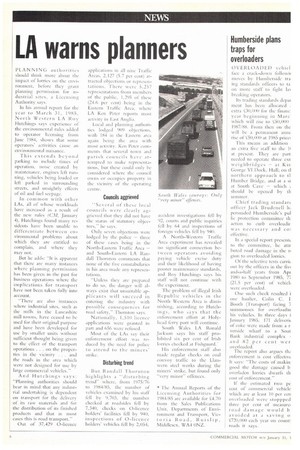LA warns planners
Page 6

If you've noticed an error in this article please click here to report it so we can fix it.
PLANNING authorities should think more about the impact of lorries on the environment, before they grant planning permission for industrial sites, a Licensing Authority says.
In his annual report for the year to March 31, 1985, North Western LA Roy Hutchings says experience of the environmental rules added to operator licensing from June 1984, shows that sonie operators' activities cause an environmental nuisance.
This extends beyond parking to include times of operation, noise created by maintenance, engines left running, vehicles being loaded or left parked in surrounding streets, and unsightly effects of oil and fuel seepage.
In common with other LAs, all of whose workloads have increased as a result of the new rules /CM, January 4), Hutchings found many residents have been unable to differentiate between environmental problems about which they are entitled to complain, and where they may not.
But he adds: "It is apparent that there are many instances where planning permission has been given in the past for business operations where the implications for transport have not been taken fully into account.
"There are also instances where industrial sires, such as the nulls in the Lancashire mill towns, have ceased to be used for their original purpose and have been developed for USe by smaller units without sufficient thought being given . to the effect of the transport operations ....on the properties in the vicinity . . . and the roads in the area which were not designed for use by large commercial vehicles."
And Hutchings says: "Planning authorities should bear in mind that any industrial undertaking is dependent on transport for the delivery of its raw materials and for the distribution of its finished products and that in most cases this is road transport."
Out of 37,429 0-licence applications in all nine Traffic Areas. 2,127 (5.7 per cent) attracted objections or representations. There were 5.257 representations from members of the public, 1,295 of these (24.6 per cent) being in the Eastern Traffic Area, where LA Ken Peter reports most activity in East Anglia.
Local and planning authorities lodged 909 objections, with 184 in the Eastern area again being the area with most activity. Ken Peter comments that several town and parish councils have attempted to make representations, but these could only he considered where the council owns or occupies property in the vicinity of the operating centre.
Councils aggrieved
"Seieral ul these local councils were clearly aggrieved that they did not have the status of statutory objectors." he says.
Only seven objections were lodged by the police — three of these cases being in the North-Eastern Traffic Arca — and South-Eastern LA Randall Thornton comments that none of the five constabularies in his area made any representations.
"Unless they are prepared to do so, the danger will always exist that unsuitable applicants will succeed in entering the industry with possible consequences for road safety," Thornton says.
Nationally, 1,510 licence applications were granted in part and 656 were refused.
Most of the LAs say their enforcement effort was reduced by the need for police to attend to the miners' strike.
Disturbing trend
But Randall Thornton highlights a "disturbing trend" where, from 1975/76 to 1984/85, the number of vehicles examined by his staff fell by 9,703, the number checked at roadsides fell by 7,340, checks on 0-licence holders' facilities fell by 940, inspections of 0-licence holders' vehicles fell by 2,054,
accident investigations fell by 92, courts and public inquiries fell by 64 and inspections of foreign vehicles fell by 940.
A North-Western Traffic Area experiment has revealed no significant connection between Operators avoiding paying vehicle excise duty and their likelihood of having poorer maintenance standards, and Roy Hutchings says Ins staff will not continue with the experiment.
The problem of illegal Irish Republic vehicles in the North Western Area is diminishing, according to Hutchings, who says that the entbrcement effort at Holyhead ferry port will continue, South Wales LA Ronald Jackson says his staff pro . hibited six per cent of Irish lorries checked at Fishguard."
His enforcement staff also made regular checks on coal convoy traffic to the Llan wern steel works during the miners strike, but found only "very minor" offences.
*The Annual Reports of the Licensing Authorities for 1984/85 are available for V.4.70 Irons the Sales Publications Unit, Departments of Environment and Transport, Victoria Road, Ruislip, Middlesex, WA4 ()NZ.






















































